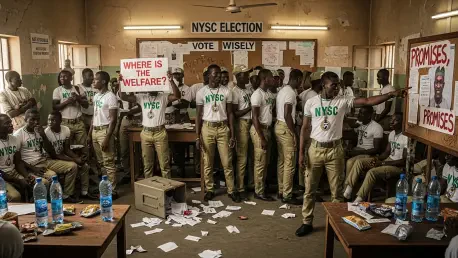In the heart of Nigeria’s democratic process, National Youth Service Corps (NYSC) members stand as vital cogs, ensuring the smooth operation of elections as ad-hoc staff under the Independent National Electoral Commission (INEC). Despite their indispensable role at polling units across the nation, many of these young volunteers face dire circumstances, including unpaid insurance claims for injuries or deaths sustained during electoral duties. Reports of violence, inadequate compensation, and neglect paint a troubling picture of the conditions under which they serve. The House of Representatives Committee on Electoral Matters has recently stepped in, issuing directives to address these long-standing grievances. This development raises critical questions about systemic failures and the urgent need for reform to protect those who safeguard the integrity of Nigeria’s elections. The plight of these corps members is not just a matter of policy but a reflection of how society values its youth.
Addressing Systemic Failures in Welfare Support
Unpaid Insurance Claims and Broken Promises
The issue of unpaid insurance claims for NYSC members injured or killed during election duties remains a glaring concern, despite clear agreements between NYSC and INEC. A Memorandum of Understanding stipulates a N1 million coverage for such incidents, yet countless claims linger unresolved, leaving affected individuals and their families in distress. Specific cases, such as corps members shot in Delta and Akwa Ibom States with permanent injuries, highlight the personal toll of this neglect. The House Committee on Electoral Matters has mandated that INEC ensure these payments are processed within a tight four-week window, signaling a push for accountability. However, the delay in honoring these commitments raises doubts about the mechanisms in place to enforce such policies. For many, the wait for compensation is not just a financial burden but a profound injustice, undermining trust in the institutions meant to protect them while they serve the nation.
Inadequate Compensation and Harsh Working Conditions
Beyond unpaid claims, the remuneration and working conditions for NYSC members during elections are shockingly insufficient, adding another layer of hardship to their service. Currently, these young volunteers receive a meager N4,000 for training and N13,500 for election day duties, sums that barely cover basic needs. Compounding this issue are the deplorable conditions they endure, often lacking proper accommodation, access to clean water, or other essential amenities. Such environments not only jeopardize their health but also diminish the dignity of their critical role in democracy. Reports of corps members sleeping in unsafe or unsanitary locations during election periods are far too common. This situation demands a reevaluation of how their contributions are valued, pushing for better logistical support and fairer pay to reflect the risks and efforts involved in their duties. Without these changes, the system risks alienating the very individuals it relies on for grassroots electoral integrity.
Proposing Solutions for Lasting Change
Enhancing Security and Structural Reforms
Turning to actionable solutions, enhancing the security of NYSC members during electoral assignments emerges as a top priority to prevent further tragedies. Past incidents, including the heartbreaking loss of 10 corps members in a violent attack over a decade ago, underscore the vulnerability of these young volunteers in volatile environments. Suggestions from NYSC officials, such as involving the Office of the National Security Adviser in deployment planning, point to the need for a more coordinated approach to safety. Stronger security measures, including better training on risk management and real-time support during elections, could significantly reduce exposure to harm. The House Committee’s insistence on prioritizing welfare reflects a growing consensus that no election outcome justifies risking lives. Implementing these protective strategies would not only safeguard corps members but also strengthen public confidence in the electoral process as a whole.
Ensuring Policy Implementation and Dignity in Service
Equally critical is the need to bridge the gap between policy and practice to ensure that welfare commitments for NYSC members are not mere words on paper. The directive to expedite insurance payouts is a step forward, but sustained oversight is necessary to guarantee compliance and prevent future lapses. Beyond financial compensation, a comprehensive overhaul of support systems—covering training, accommodation, and logistical arrangements—must be prioritized to uphold the dignity of these volunteers. Chairman Adebayo Balogun of the House Committee has articulated a powerful stance: the life of a single Nigerian youth outweighs the value of any election. This perspective should guide reforms, ensuring that corps members are treated with the respect and care their service warrants. Looking ahead, consistent monitoring and stakeholder collaboration will be essential to transform these directives into tangible improvements, reinforcing the foundation of Nigeria’s democracy through the protection of its youth.









